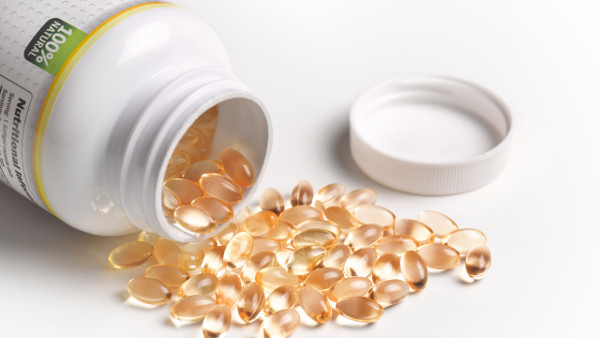Vitamin D
Vitamin D

Description:
Vitamin D is a fat-soluble vitamin. Its main role in the body is to provide for the proper absorption and utilization of calcium and phosphorus. It is necessary for growth, and especially important for bone formation and density. This is most important in preventing osteoporosis. The form of vitamin D that we get from our foods or supplements is not fully active. It requires conversion by the liver, and then the kidneys, before it can perform its functions. This is why people with kidney or liver problems are more at risk for osteoporosis. Exposure to sunlight allows the body to produce vitamin D on the skin. This helps to increase vitamin D levels in the body. Deficiency of vitamin D leads to rickets in children, while in adults vitamin D deficiency will lead to osteoporosis.
Complimentary Nutrients:
Phosphorus, A, C, F, choline, and calcium.
Antagonists:
Intestinal disorders, liver and gallbladder problems interfere with the absorption of vitamin D. Some cholesterol lowering drugs, antacids, mineral oil, and steroid hormones also interfere with absorption of this important vitamin. The use of diuretics like Diuril, or Esidrix, disturb the body’s calcium/vitamin D ration. Do not take vitamin D without adequate amounts of calcium.
Health Benefits:
Nervous system maintenance, bones, heart, thyroid gland, calcium and phosphorus metabolism – bone formation, skin, teeth, normal blood clotting, and skin respiration.
Therapeutic Uses:
Stress, acne, allergies, cystitis. eczema, arthritis, osteomalacia, psoriasis, rickets, and alcoholism.
Vitamin Therapies should be done with the supervision of a qualified health care professional. In the panel on the left, under ailments you can find more information about treatments for some of these conditions. You can also locate therapeutic information on this site by using the search engine – click on ‘Search’ in the panel on your left – and entering words relating to the ailment you are interested in.
Deficiency Indicators:
Diarrhea, softening bones and teeth, burning sensation in mouth and throat, insomnia, myopia, poor metabolism, and nervousness.
Dosage:
| RDA | Optimal Health | Therapeutic Amounts |
|---|---|---|
| 75 IU | 400 IU | 600 IU |
RDA (Recommended Daily Allowance) are dosages developed by the FDA. These amounts are designed to prevent deficiency symptoms. For optimal health it is necessary to take a larger dose. The optimal health amounts are for adults and children weighing over. 100 lbs. Children under the age of six should be given nutritional formulas designed specifically for young children. The therapeutic amounts to treat special conditions are usually much higher, and should not be taken without the supervision of a qualified health care professional.
Be careful not to overdose on Vitamin D because it can become toxic. Unlike water soluble vitamins, where the body excretes excessive amounts, Vitamin D – a oil soluble vitamin, can accumulate in the body to toxic levels.
Toxicity Symptoms: nausea, vomiting, diarrhea, increased urination, muscular weakness, dizziness, weariness, and appetite loss
Sources:
Fish liver oils, fatty saltwater fish, dairy products, eggs yolks, organ meats, bone meal. and sunlight. Here are some examples.
| Food | Amount | IU |
|---|---|---|
| beef liver | 1/4 lb. | 40 |
| milk | 1 CUP | 100 |
| canned tuna/salmon | 1/4 lb. | 300 |






Leave a Reply